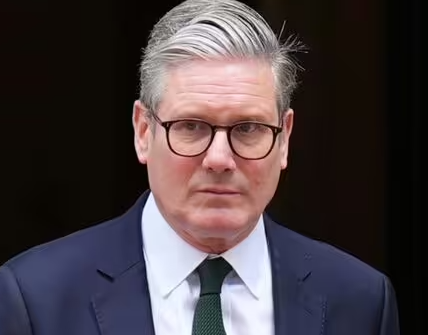The Cabinet has broken out into a brutal war of words after the Health Secretary took aim at Ed Miliband’s previous leadership.
Ed Miliband quizzed on not backing action in Syria in 2013
The Cabinet has descended into open warfare this morning after Wes Streeting blasted a crucial misstep by Labour under Ed Miliband’s leadership in the early 2010s.
The Health Secretary launched an astonishing war of words at his cabinet colleague, blasting the decision to oppose military action against Syrian president Bashar al-Assad in 2013.
After the dictator used chemical weapons against his own people, then-PM David Cameron asked parliament to vote in favour of military intervention in Syria to deter the crime from ever happening again.
While Ed Miliband initially told No. 10 he was supportive of action, he sensationally pulled support at the last minute for party political purposes.
The US subsequently got cold feet, and decided it would not take action without Britain’s backing.

Wes Streeting blasted Ed Miliband (Image: Getty)

Mr Streeting criticised Ed Miliband’s decision in 2013 (Image: BBC)
On Question Time last night, Mr Streeting observed: “If the West had acted faster, Assad would have been gone.”
“With hindsight, I think we can say, looking back on the events of 2013, that the hesitation of this country and the United States created a vacuum that Russia moved into and kept Assad in power for much longer.”
Mr Miliband openly boasted about his decision to stand up to President Obama, though it was thought he had opposed intervention due to Labour still bitterly divided about the decision to go to war in Iraq.
The Climate Secretary has now hit back, describing his senior Cabinet colleague as “just wrong”.
Mr Miliband told Times Radio: “The decision I was confronted with in 2013 was whether we did a bombing of President Assad without any clear plan for British military engagement, where it would lead and what it would mean.
“And I believe then, and I do now, that one of the most important lessons of the Iraq war is we shouldn’t go into military intervention without a clear plan, including an exit strategy.
“Now, we know that President Trump, when he was in power, bombed Syria in 2017 and 2018. Clearly, that didn’t produce the fall of President Assad’s regime. So when people say that somehow if we bombed President Assad in 2013, he would have toppled over, frankly, it’s just wrong.”
“I think it is very easy for people to say that the answer to the problems of the world is British military intervention, but as I said earlier, in this case we have a clear understanding of what the consequences might have been because in 2017 and 2018 there was military action against President Assad and it certainly didn’t precipitate the fall of his regime.
“I took the decisions I did because the British involvement in Iraq led to the deaths of our troops and was, rightly in my view, seen as a very serious error and so without re-going over all of that history, I think we drew the right lessons from that.”
